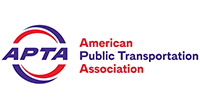Bus Awards – Gold
Award: Bus Safety
Member Type & Size: Bus Transit System with More Than 4 million and Fewer than 20 million Passenger Trips Annually
Pace Suburban Bus (Pace), Arlington Heights, Illinois
In 2020, Pace Suburban Bus put 85 buses into service with pedestrian avoidance technology. While the goal was zero accidents, from 2020 to year-to-date 2023, Pace experienced only one accident involving a bus with the technology. With the growing adoption of dedicated bike lanes and the expansion of pedestrian infrastructure within Pace’s service area, accident-avoidance technology has become more critical. The implementation of the collision avoidance system increased the safety of employees, passengers, bicyclists, and pedestrians and provides bus operators with additional awareness and early warning of potentially dangerous situations which, in turn, allows more time for corrective actions to be taken.
Award: Bus Security
Member Type & Size: Bus Transit System with More than 20 million Passenger Trips Annually
New Jersey Transit Corporation (NJ Transit), Newark, New Jersey
Assaults against public transit workers is an increasing problem for transit agencies across the United States. Assaults against employees can trigger financial, operational, and organizational costs to an agency. The New Jersey Transit Police developed and implemented an in-depth training program titled “De-Escalation Tools for Bus Operators” which instructs operators to curtail situations and alert law enforcement. By de-escalating incidents before they become assaults, NJ Transit is increasing the safety of its employees and passengers. The training is based on the National Transit Institute’s “Assault Awareness and Preparedness for Transit Employees,” and was created through a collaboration with operational employees at the agency. The training is delivered by a court advocate and employees in operations, a model that can be replicated by other transit agencies.
Award: Bus Emergency Management
Member Type & Size: Bus Transit System with More than 20 million Passenger Trips Annually
Capital Metropolitan Transportation Authority (CapMetro), Austin, Texas
In 2020 CapMetro created a full-time emergency preparedness program that included the creation of the CapMetro Emergency Operations Center, which coordinates the agency’s emergency response. In 2022, CapMetro’s new program created 19 emergency response plans and CapMetro is developing 6 more plans as well as revising the agency’s continuity of operations plan. This new program has led to measurable improvements in CapMetro’s response to recent events such as winter storms, and high profile and widely attended special events. Further, emergency preparedness personnel conduct drills and exercises to assess the agency’s capabilities. As a result of these efforts, CapMetro was able to support transit agency system requirements and community needs. This effective program can be seen as a best practice for other agencies looking to create their own emergency management program.
Bus Awards – Certificates of Merit
Award: Bus Security
Member Type & Size: Bus Transit Systems with Fewer than 4 million Passenger Trips Annually
Corpus Christi Regional Transportation Authority (CCRTA), Corpus Christi, Texas
To enhance security at transfer stations, facilities and aboard buses, the Corpus Christi Transportation Authority, (CCRTA) increased the number of police officers and security guards deployed at these locations. This tactic led to a sizable decrease in the total number of incidents reported over previous years. By investing in system safety and security, CCRTA is thwarting negative after-effects as well as agency liability and increasing employee wellbeing.
Award: Bus Emergency Management
Member Type & Size: Bus Transit Systems with Fewer than 4 million Passenger Trips Annually
Corpus Christi Regional Transportation Authority (CCRTA), Corpus Christi, Texas
During emergency incidents, the Corpus Christi Transportation Authority, (CCRTA) partners with the City of Corpus Christi and the Nueces County’s Emergency Operations Center to facilitate the evacuation of individuals in affected areas. Through close coordination with their partners, CCRTA responds to emergency and non-emergency events in their 846 square mile area of operation. CCRTA’s emergency management program ensures safe and accessible transportation for all residents, in both the Corpus Christi metropolitan and rural service areas.
Award: Bus Safety
Member Type & Size: Bus Transit System with less than 4 Million Passenger Trips Annually
METRO Regional Transport Authority (Metro RTA), Akron, Ohio
To reduce the occurrence of accidents involving buses, and the associated financial costs, METRO RTA enhanced its safety initiatives to reduce the occurrence of speeding by bus operators. To accomplish this, METRO RTA purchased radar guns that allowed for the measurement of the speed of a bus in real time. Bus routes were also adjusted to reflect realistic runtimes and to discourage speeding. Since this initiative was put into operation, fewer dollars have been spent on property damage and personnel claims.
Award: Bus Security
Member Type & Size: Bus Transit System with less than 4 Million Passenger Trips Annually
METRO Regional Transport Authority (Metro RTA), Akron, Ohio
Since the creation of the METRO RTA Transit Police department in 2017, RTA has continued to advance security efforts to decrease incidents on the system. RTA outfitted their fleet of buses with improved camera systems, providing clearer images inside and outside of each bus. Images are shared with surrounding local law enforcement agencies to assist with criminal investigations. Additionally, RTA outfitted all transit officers with body worn cameras. Body worn cameras increase transparency and accountability, decrease civilian complaints, and help de-escalate situations.
Award: Bus Emergency Management
Member Type & Size: Bus Transit System with Greater than 20 million Passenger Trips Annually
Miami-Dade Transit, Miami, Florida
Using a grant from the Department of Homeland Security, Miami-Dade Transit developed a bus familiarization training program for first responders that enhances the effectiveness of their response and increases safety by providing first responders with detailed information on bus composition. The course instructs first responders on what bus apparatuses to stay clear of, such as pressurized natural gas canisters or electrical wiring. The training has received positive feedback from partner agencies. The bus familiarization training can reduce the amount of damage done to a bus during an incident and is necessary to increase safety when adopting newer technologies like all-electric buses.




